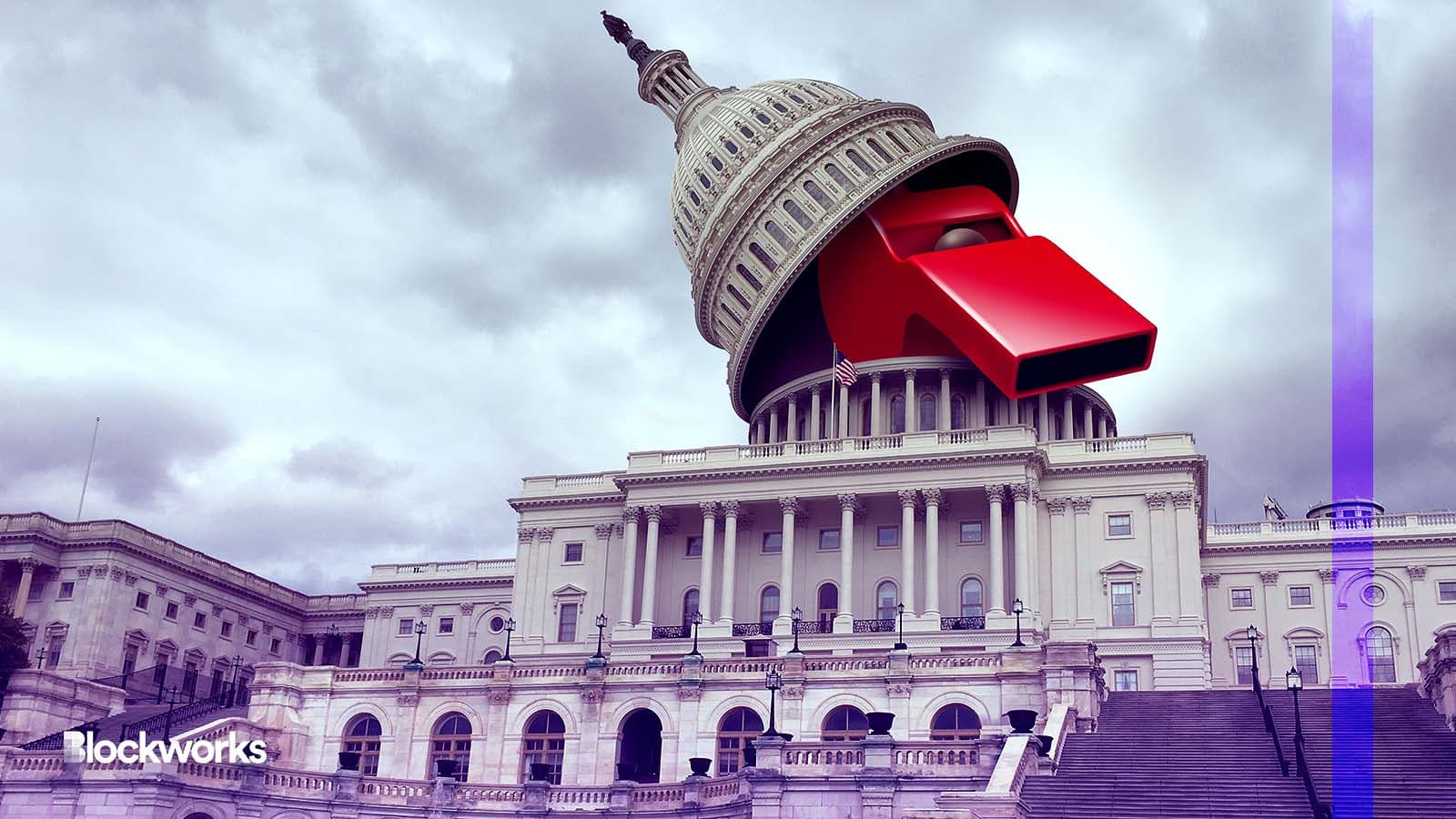Crypto Has Too Many Bad Actors. Here’s How To Make Them Pay.
There’s more than enough crime in crypto to make a solid whistleblower program a key way to crack down on bad actors

Lightspring/Shutterstock, modified by Blockworks
The US has introduced a new anti-money laundering whistleblower act that could change how cryptocurrency crimes are policed worldwide.
If done right, the empowerment of crypto whistleblowers through the AML Whistleblower Improvement Act can mark a revolutionary advancement in policing money laundering and sanctions violations in the US and abroad.
On Dec. 23, 2022, the United States Congress passed the Anti-Money Laundering (AML) Whistleblower Improvement Act to establish an effective whistleblower award program for individuals who report money laundering, violations of the Bank Secrecy Act, and sanctions busting.
Given the increasing prevalence of cryptocurrency in money laundering and sanctions-busting schemes, the new law has immense implications for whistleblowers employed by crypto exchanges.
The updated AML Act is based on the highly successful Dodd-Frank Act, which established the SEC’s Whistleblower Program and has been universally praised by every SEC chair, of either political party, since it was enacted in 2010. To date, information from whistleblowers has resulted in over $6.3 billion in total monetary sanctions. Correspondingly, over $1.3 billion has been awarded back to the whistleblowers. These financial incentives are the heart of the SEC’s program.
All eyes are now on the Treasury Department’s Financial Crimes Enforcement Network (FinCEN) as it develops the new program regulations.
How the Treasury department implements this new law could stifle its effectiveness or enhance its ability to fully incentivize whistleblowers worldwide to report money laundering and sanctions violations.
What FinCEN can do right
When writing the new regulations, FinCEN must consider:
- Establishing an effective whistleblower office that fully communicates with the Department of Justice and other law enforcement partners to ensure the broadest prosecution of money laundering, sanctions violations, and criminal activity related to cryptocurrency.
- Wide-scale publicity concerning the new program and its filing requirements. Take the SEC and its user-friendly website. If people cannot easily learn their rights, the law will never work to its full potential.
- Ensuring that the confidentiality and anonymity provisions are effectively implemented, and that training occurs throughout both Justice and Treasury to ensure that whistleblower rights are protected.
- Mandate that all rewards be paid within 12 months of the government’s collection of sanctions from the wrongdoer.
- Strictly follow the Tax Court’s holding in Whistleblower 21276-13W v. Commissioner of IRS, 144 Tax Court 290 (2015) where it was decided that Form 211 need not be filed before a whistleblower provides information to other parts of the Internal Revenue Service (IRS).
- Using its authority to narrowly define parts of the law that could be interpreted to restrict whistleblowing, and broadly interpret other provisions to ensure that whistleblowers are not unduly penalized.
For example, the SEC’s definition of “voluntary” has been widely criticized as too restrictive, for it cuts off protections for whistleblowers who voluntarily provide information that was not compelled by subpoena or other legal processes. FinCEN must not follow in the SEC’s misguided footsteps on this issue.
On the other hand, FinCEN needs to recognize that participants in illegal activity need to be incentivized to come forward as well, as they are often the best sources of information. The DOJ under the False Claims Act, the SEC under the Dodd-Frank Act, and the IRS under its own law have all approved reasonable balancing tests that permit participants (who did not plan or initiate the crime) to receive a financial reward.
The AML advantage
The AML law expands federal jurisdiction over policing cryptocurrencies. The law covers all types of money laundering with broad transnational scope and, for the first time, whistleblowers will receive state of the art protections for reporting violations of sanctions.
FinCEN has already spearheaded strong enforcement actions against crypto exchanges that have broken AML laws, Suspicious Activity Report (SARs) requirements, and the Bank Secrecy Act. These actions often involve large financial sanctions, such as the $100 million in fines in the 2021 busting of BitMEX.
In August 2022, the US Department of the Treasury’s Office of Foreign Assets Control (OFAC) sanctioned Tornado Cash, a virtual currency mixer, for laundering over $7 billion. More recently, Politico reported that Huobi and KuCoin, two Seychellois crypto exchanges, had allowed sanctioned Russian banks to use their platforms. A loophole permitted crypto buyers to trade with each other using accounts at these banks. These exchanges have not been the subject of legal action thus far.
With the FinCEN whistleblower program set up right, these are all types of cases where the law would encourage whistleblowers to come forward and report wrongdoing themselves.
Under this new law, crypto whistleblowers can report on violations of anti-money laundering laws, failure to comply with SARs and know-your-customer (KYC) requirements, sanctions violations, and misconduct covered under the Bank Secrecy Act. Reporting on these issues is not limited to those employed by crypto exchanges. Anyone with information is welcome to come forward.
Cryptocurrencies have been used to hide illegal money laundering and sanctions violations: Crimes that are designed to be invisible to law enforcement. The incentivization of insiders is key in deterring these types of activities and holding wrongdoers fully accountable.
Get the news in your inbox. Explore Blockworks newsletters:
- The Breakdown: Decoding crypto and the markets. Daily.
- 0xResearch: Alpha in your inbox. Think like an analyst.






